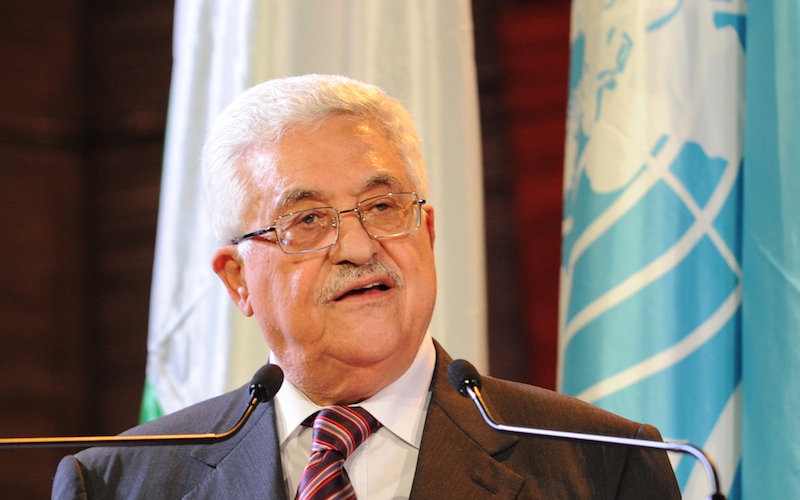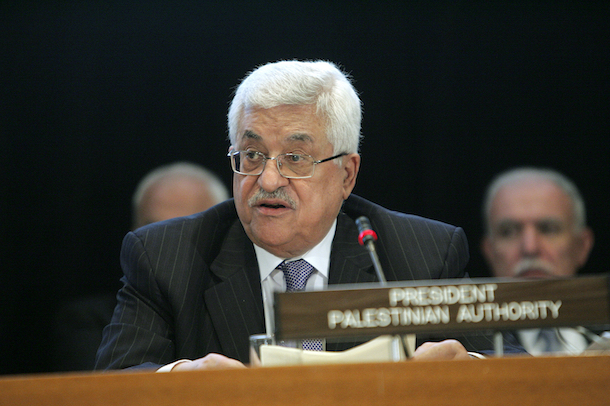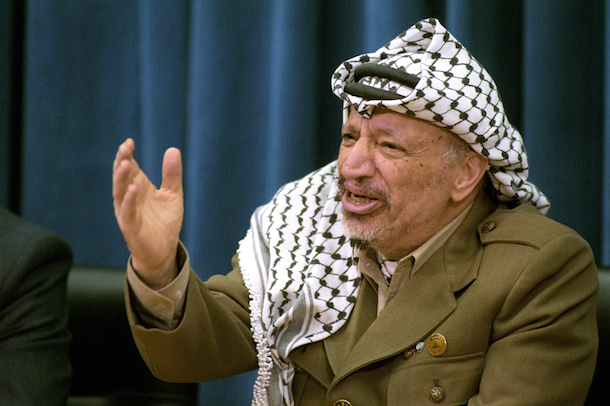
Palestinians Need Better Leadership
Palestinians have thus far failed to produce leaders capable of challenging foreign (British) occupation, Jewish separatism and establishment of a new state (Israel), Israeli occupation, and Israeli economic domination. To date, they have been unable to put forward a group of leaders who could chart their side of a path toward a Palestinian state. In their long struggle they have basically had four leaders following the practice of other countries in the Middle East that of one-man rule for a long period or for life. Those four leaders have been Amin Al-Husseini, Ahmad Shukairy, Yasser Arafat, and Mahmoud Abbas. A brief review of the tenure of these four leaders may be instructive.
Amin Al-Husseini “led” the Palestinians from 1921 to 1948. Husseini came from a prominent Jerusalem family and became the leader when the British High Commissioner appointed him in 1921 as the Grand Mufti (highest religious authority in Palestine, a British-created position), and also as the president of the Supreme Muslim Council. In 1936 the Arab Higher Committee, chaired by Al-Mufti, began to coordinate anti-British and anti-Zionist activities. In 1939 the British removed Al-Husseini from the presidency of the Supreme Muslim Council and the chairmanship of the Arab Higher Committee, which they declared to be an illegal entity. Al-Husseini then escaped to Lebanon, Iraq, Turkey, and Italy, and ended up in Germany, where he broadcast unsuccessful appeals for Arabs to support the Germans. In 1948 he declared an all-Palestine Government in exile. It was totally dependent on Egyptian support and was soon abandoned. Egyptian authorities escorted him back from Gaza to Egypt. The British made him and then unmade him. He relied later in life on Egypt; a country that itself was in need of help. From 1948 until his death in 1974 the Palestinians themselves gave him the worst vote a political leader can anticipate. They ignored him.
Ahmad Shukairy, who died in 1980, was born in Lebanon and received early education in Palestine before enrolling at the American University of Beirut, from which French authorities eventually dismissed him for participation in the liberation movement. Ahmad Shukairy participated in the Palestinian struggle during the 1920s, 1930s and 1940s, mostly as a lawyer and media spokesman, until he, like so many others, became a refugee in 1948. Thereafter, he began an interesting career as a diplomat, first for Syria at the UN (1949-1950), later for the League of Arab States (1950-1957), and then for Saudi Arabia (1957-1964). He is best remembered for his lengthy and often amusing speeches at the UN, frequently critical of Israeli policies. His diplomatic contacts with other Arabs served him well one last time when the heads of Arab states, meeting in their first summit in 1964, appointed him representative of the Palestinian people. He is best remembered for establishing the PLO and for being instrumental in forming other Palestinian institutions, such as the Palestine Liberation Army, the Palestine National Fund, and the Palestine Research Center. Beyond that, he is remembered for many books and articles that kept the Palestinian issue before Arab and international audiences.
Yasser Arafat, who died in 2004, studied engineering at the University of Cairo. In 1957 he founded Fatah as primarily a guerilla group, which took its first action against Israel in 1965. Fatah joined the PLO in 1968. In 1969 he was elected as PLO Chairman. Arafat proceeded to redirect the PLO from a Pan-Arab movement, as advocated by Shukairy, to one that is essentially a movement of Palestinian nationalism. He succeeded in getting the Arab states to agree, and in 1988 the Arab states formally abdicated the Palestinian cause by simply proclaiming a Palestinian state, in essence letting the Palestinians face Israeli occupation alone. Shortly thereafter, the Central Committee of the Palestine National Council (not the entire National Council) elected Mr. Arafat as President of Palestine. Mr. Arafat began to behave as a head of state, and much of his trouble thereafter consisted of his inability to reconcile obligations of a head of a state under occupation with limited authority, with his role as leader of a resistance movement.
Mr. Arafat repeated many of the errors committed by the Grand Mufti. Supporting the Saddam Hussein regime in Iraq against an array of international powers, Mr. Arafat lost when Saddam lost the 1991 war, and the Palestinian people paid a heavy price.
Continuing the pace of unilateral action (i.e., without coordination with Arab allies), Mr. Arafat negotiated a separate agreement with the Israelis (the Oslo Accords), revised the Palestine Charter, and announced his recognition of Israel’s right of existence. In 1994 the Israelis withdrew for the first time from Gaza and Jericho. Mr. Arafat was allowed to return to Palestine. In 1996 he was elected president of the newly formed Palestine National Authority.
Unlike the two first Palestinian leaders, Arafat had an opportunity to lay the foundations for a Palestinian state. The Oslo Accords did not establish a Palestinians state, but outlined intermediate steps after which a state could be established. What transpired under Arafat was not encouraging. Palestinian leadership did not seem to want, seek, or encourage wide consideration of its actions by the Palestinians within or outside the territories. Arafat was allowed to return to Palestine with a significant number of his Palestine Liberation Army, now designated as security forces and equipped with a limited number of small arms. It did not take long before the PNA began to use its security forces against its own people. The PNA acted much like any repressive neighboring regime.

In 2000 the second Intifada began as a tool to counteract Israeli subjugations. This effort did not accomplish much, beyond resulting in the death of thousands of Palestinians, devastation of the Palestinian economy, and extensive damage to the Palestinian social fabric. It is tragic that the second Intifada cost Palestinians almost as many lives as did the 1936 uprising led by the Grand Mufti, and it turned out to be just as poorly led.
Arafat departed the scene a controversial leader. Towards the end of his life he was marginalized by the Israelis and the Americans, and forced to spend the balance of his life in deplorable conditions amounting to house arrest in a British-built regional government building and prison. The cause of his death is still officially unknown, though many believe that he was poisoned. It is rumored that Arafat himself told associates near the end that the Israelis finally “got to me through the kitchen.”
Arafat was a charismatic leader whose leadership was difficult to challenge, even if Israel had not embarked on a deliberate policy to assassinate budding and potential challengers. One can name even close associates of Arafat who were assassinated by Israeli hands, such as Khalil al-Wazir and Salah Khalaf. Tens of other potential Palestinian leaders, including leaders of Hamas and other Palestinian political organizations, were assassinated prior and subsequent to Arafat’s own death.
Mahmoud Abbas was born in Safed in British-occupied Palestine in 1935, became a refugee in 1948, was educated in the University of Damascus, and received a doctorate in history from the Peoples Friendship University of Russia in 1962. He spent most of his adult life working with Arafat in Fatah as a founder and leader, becoming a member of its Executive Committee and head of the Negotiations Affairs Department. He achieved international renown in 1993 with the Oslo agreement and the famed White House lawn signatures. After developing a reputation as a “pragmatist” he was urged on as a possible Prime Minister acceptable to Israel and the United States. Upon Arafat’s death in November 2004 he was named head of the Executive Committee and became President. He ran for election in January 2005, garnering 62% of the vote on a platform that advocated the end of armed confrontation with Israel, the development of the economic capacity of Palestinian territories, and the expansion of Palestinian political participation. He has continued to be President without running for re-election every four years, as Palestinian law requires.
Transitional Leadership
Recent agreements expect the West Bank and Gaza to join forces again and to hold joint elections. If Fatah and Hamas form a new coalition government, at least in the short-term, it would be necessary to turn leadership of the Palestinians to leaders of both organizations, who enjoy currently a measure of name recognition and popular support. These leaders would also have to have, as a group if not individually, a modicum of support from the U.S., the Arab League, and the European community. Fortunately for the Palestinians, there is no shortage of such personalities. The individuals named here are but a sample of the many members of the political elite of the West Bank and Gaza.

Salam Fayyad, former Prime Minister, was born in Deir Al-Ghusn in the West Bank in 1952. He is a graduate of the American University of Beirut. He received his MBA from St. Edward’s University and has a doctorate in economics from the University of Texas at Austin. He taught economics at Yarmouk University, Jordan, and served as regional manager of the Arab Bank in the West Bank and Gaza. He worked at the World Bank 1987-1995 and was the IMF’s representative to Palestine until 2001. He was appointed first as Finance Minister in the Fatah-controlled administration, from 2002-2005. When President Abbas dismissed Mr. Ismail Haniyeh as Prime Minister, Mr. Fayyad was appointed Prime Minister in 2007. He is known for his efforts to rebuild the Palestinian economy despite the occupation.
Ahmad Qurai was born in Abu Dis, a suburb of Jerusalem, in 1937 and is an economist and businessman. He became head of the Economics Department of the Executive Committee of the PLO in 1983 and has specialized in Palestinian economic matters since 1994. He has taken interest in security issues developing a reputation as a pragmatist and a close associate of Mahmoud Abbas, whom he replaced in October 2003 as Prime Minister. Qurai resigned his Prime Ministerial position when the second legislative elections resulted in the overwhelming defeat of Fatah. He is now a member of the PLC.
Rami Hamdallah replaced Salam Fayyad as Prime Minister in 2013. He was born 1958 in Anabta, north West Bank, and attended the University of Jordan. He received an MA from the University of Manchester and a doctorate in linguistics from Lancaster University. He taught and held administrative positions at An-Najah University, where he became President in 1998.
Ismael Haniya was born in 1963 and grew up in a refugee camp in Israeli-occupied Gaza. He received his education at the Islamic University in Gaza. He was arrested several times by the Israelis and escaped at least one Israeli assassination attempt. He was exiled for a time to Lebanon.
After the 2006 elections the PLC selected him by majority and gave him charge to form a government by President Abbas. He was not allowed to demonstrate leadership ability or lack of it over both the West Bank and Gaza, so he became the head of government in Gaza from 2006 to 2017, when he replaced Khaled Mesha’al as the head of the Political Bureau. His task of managing the affairs of Gaza under siege and attack is not enviable.
Khaled Mesha’al, the ideological head of Hamas until recently, was born in the West Bank near Ramallah. He received a BA in physics from the University of Kuwait, but rose to world attention when Israeli agents tried to assassinate him with a slow-acting poison on the streets of Amman in 1997.
Mahmoud Zahar, the leader of the Hamas majority in the PLC, is a surgeon who has been teaching at the Islamic University in Gaza. The Israelis bombed his home in an attempt to kill him, but killed several members of his family instead.
Yehia Sinwar, Haniya’s replacement as leader in Gaza, grew up in a refugee camp in Khan Younis, but spent 22 of his 55 years in Israeli jails. He was chosen in February 2017 in a secret ballot that was viewed broadly as a move to unite the Organization’s military and political wings, since Mr. Sinwar was one of the founders of a security unit that pursued collaborators with the occupation.
Marwan Barghouthi (b. 1959) is perhaps the most popular Palestinian political leader today. He was born in a village near Ramallah in the West Bank. He grew up and spent his entire life under Israeli occupation, in resistance to Israeli occupation, participating in both Intifadas. He attended Birzeit University, which granted him a BA in History and Political Science in 1994, and then an MA in International Relations in 1998. In 2002 the Israelis arrested him and summarily sentenced him to five life sentences plus additional years. Nevertheless, he ran for elections from prison in 2006 and was elected to the Palestinian Parliament. The same occurred in the municipal elections of 2017.
Elections and One-Man Rule
Legislative elections are another step in the Palestinian search for leadership, and so are municipal elections, and they are improved steps at that. Elections, no matter what the result, are still better than reliance on a foreign power selecting a cleric with no political skills as the nation’s leader (the Grand Mufti), or on neighboring countries looking for a token Palestinian mouthpiece to call a leader (Shukairy), or a handful of activists crowning a young firebrand (Arafat).
Unfortunately, legislative elections were not allowed to take their “normal” course in political development. U.S. and Israeli opposition to the popular success of Hamas helped derail the search for a new Palestinian leadership. At a minimum, the 1996 and 2006 elections helped end the haphazard way of the last 80 years for selecting leaders. Elections set precedent by selecting two prime ministers (Abbas and Qurai) and two presidents (Arafat and Abbas) through open elections and legislative majorities. Continuation of legislative and presidential elections processes may be seen as steps in the experiment towards Palestinian democracy at large. The U.S. and Israel would do well to support and respect the results of future elections.
Chances for democratic elections have decreased recently in the aftermath of the U.S.-Arab-Muslim summit in Riyadh, and the rift within the Gulf States Cooperative Council. There are serious behind-the-scenes efforts to install as leader of Gaza, and possibly as successor to Abbas, Mohammad Dahlan, a former disgraced Fatah security officer who has the backing of the UAE and Egypt. If so installed, Dahlan will derail what little progress the Palestinians have made in selecting their own leaders.
There is an ample pool of candidates for leadership. Most of them are young, products of Israeli occupation. The torch is being passed to a new generation that has been schooled under Israel’s own tutelage. Israel and the world will have to accept the fact that after more than 50 years of occupation the leaders of the Palestinians are the products of its own occupation, those same people who have been imprisoned (650,000 Palestinians are estimated to have been arrested by Israeli security forces since 1967), tortured, and/or dehumanized. The Palestinians will find new leaders among the hundreds of leaders of civic organizations that have sprouted up in the West Bank and Gaza, despite or perhaps because of the Israeli occupation. Dr. Mustafa Barghouti is a fine representative of civic society leaders. He is a Jerusalem born and Stanford educated physician, activist and current General Secretary of (Al Mubadara) the Palestinian National Initiative.
There is no lack of talent or know-how among Palestinians. One can easily identify Palestinians in the diaspora today who are leaders in every profession and who can augment the residents of the West Bank and Gaza. Bringing expatriate Palestinians into the electoral process, much as was done with expatriate Iraqis, will go a long way to enlarging the pool from which Palestinians can select their leaders. Expatriate Palestinians, in any event, should assume a greater role in helping in the recovery of Palestine, much as have members of the international Jewish community contributed to building Israel.
The Palestinian people deserve better leadership than that which they have had to call their own for four generations. The time is now.

